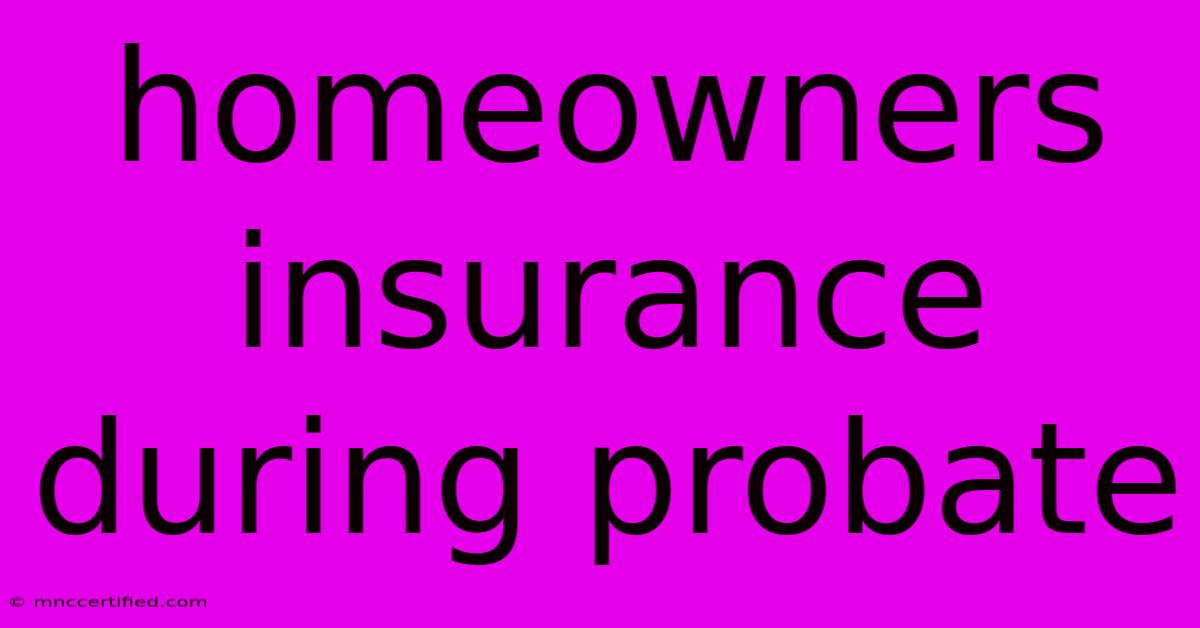Homeowners Insurance During Probate

Table of Contents
Homeowners Insurance During Probate: A Comprehensive Guide
Navigating the probate process after losing a loved one is already emotionally taxing. Adding the complexities of homeowners insurance to the mix can feel overwhelming. This guide clarifies the intricacies of homeowners insurance during probate, ensuring a smooth transition and minimizing potential financial burdens.
Understanding Probate and Its Impact on Homeowners Insurance
Probate is the legal process of administering a deceased person's estate. This includes identifying assets, paying debts, and distributing remaining property to heirs. A home is often a significant asset, and its insurance coverage plays a crucial role during this period. The specifics of how homeowners insurance is handled during probate depend largely on the state's laws and the details of the will or trust.
Key Questions Regarding Homeowners Insurance During Probate:
- Who is responsible for paying the premiums? This often falls to the executor or administrator of the estate, but the will or trust might specify otherwise. Failure to maintain coverage can lead to significant financial repercussions.
- What happens to the policy after the death of the homeowner? The policy might remain in effect, depending on its terms, but it's crucial to review the policy and understand its provisions regarding death. Some policies may automatically transfer to beneficiaries, while others may require action from the executor.
- What type of coverage is needed? The same level of coverage that was previously in place might be sufficient, but adjustments may be necessary depending on the circumstances. It's advisable to consult with an insurance professional.
- Can the home be sold with an existing policy? Yes, usually the policy can be transferred to the buyer in a property sale, but it is recommended to check the policy specifics.
- What are the implications for potential claims during probate? Filing a claim during probate follows standard procedures, but having the executor or administrator manage the process can streamline things.
Steps to Take Regarding Homeowners Insurance During Probate
Here’s a breakdown of the essential steps to manage homeowners insurance during probate:
1. Review the Existing Policy Immediately
The first and most critical step is to thoroughly review the existing homeowners insurance policy. Look for specific clauses related to death, beneficiaries, and what happens to the policy after the death of the policyholder. Understanding these details provides a foundation for making informed decisions.
2. Contact the Insurance Company
Notify your insurance provider of the death immediately. This allows them to guide you through the necessary procedures and provides clarity on policy continuation or changes required. They can also answer specific questions about coverage and premiums.
3. Determine the Executor's Responsibilities
The executor (or administrator) of the estate is typically responsible for managing the home's insurance. Their duties include paying premiums and ensuring the property remains adequately insured. Understanding these responsibilities is key to preventing lapses in coverage.
4. Consider Coverage Needs
Assess the current coverage levels. Are they still appropriate? If the property is vacant during probate, you might need to adjust the coverage to reflect the specific risks associated with vacant properties. Liability coverage remains crucial even when the property is not occupied.
5. Transferring the Policy (Upon Property Sale)
If the home is sold during probate, the homeowners insurance policy can usually be transferred to the new owner. The insurance provider will guide you through the process. Ensure this happens smoothly to avoid gaps in coverage.
Potential Pitfalls to Avoid
- Failure to Notify the Insurer: Not informing the insurance company about the death can lead to policy lapses and potential complications.
- Delayed Premium Payments: Missing premium payments can result in policy cancellation, leaving the estate vulnerable.
- Insufficient Coverage: Inadequate coverage can leave the estate exposed to significant financial losses in case of damage or liability claims.
Conclusion: Peace of Mind During a Difficult Time
Handling homeowners insurance during probate requires careful planning and attention to detail. By following the steps outlined above and seeking professional advice when needed, you can minimize stress and ensure the smooth transition of insurance coverage, providing peace of mind during an already challenging period. Remember, consulting with both a legal professional (executor/administrator) and an insurance specialist is highly recommended for navigating this complex process effectively.

Thank you for visiting our website wich cover about Homeowners Insurance During Probate. We hope the information provided has been useful to you. Feel free to contact us if you have any questions or need further assistance. See you next time and dont miss to bookmark.
Featured Posts
-
Gaetz Resigns From Congress Attorney Position
Nov 14, 2024
-
Yoshie Phillips Russell Investments
Nov 14, 2024
-
Old Fitzgerald Bottled In Bond 10 Year
Nov 14, 2024
-
Absolute Resolution Investments Llc
Nov 14, 2024
-
Verb Bonding Shampoo And Bonding Mask
Nov 14, 2024